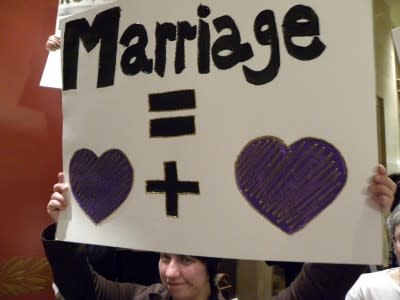Another possible Supreme Court case involving religion and gay rights
A recent court case in New Mexico could find its way to the Supreme Court as a test of several First Amendment freedoms.
Photo by Flickr user Fibonacci Blue
New Mexico neither allows gay marriage nor prohibits it, but since the Supreme Court’s summer rulings on the Defense of Marriage Act and the California referendum on gay marriage, New Mexico has become a testing ground for related issues.
On Wednesday, the Alliance Defending Marriage said it will ask the U.S. Supreme Court to review an August ruling of the New Mexico Supreme Court in Elane Photography v. Willock.
In the case, the court unanimously upheld a trial court imposition of a $7,000 fine on a photographer and a finding that she violated the state’s Human Rights Act when she refused to photograph a same-sex wedding on grounds that the assignment would conflict with her Christian beliefs.
The state law forbids businesses operated as places of “public accommodation” and open to serve the general public, to refuse to provide services to gays and lesbians.
The criticism of the ruling by the ADM is that it infringes on the photographer’s free religious practice. The criticism by the Cato Institute and leading scholars, including Eugene Volokh of UCLA and Dale Carpenter of Minnesota, is that it compels the photographer to take a point of view, or compels speech.
The photographer argues both: She says that requiring her to take photos of a same-sex wedding compels her to express approval of same-sex marriage, which she disapproves of, and interferes with her free exercise of religion through her business.
In general, the criticism is that the ruling means private businesses can’t make private decisions.
If the Supreme Court decides to hear this case, it would be the second major church-state case of the term, along with Town of Greece v. Galloway.
The highly watched Greece case is about whether it violates the Establishment Clause of the First Amendment for a town council to open its legislative meetings with a prayer because by mostly choosing Christian pastors to lead the prayer, the town is endorsing a relief or whether the prayer is acceptable because it doesn’t coerce anyone to prayer or adopt the belief of the prayer.
And there is another possible case working its way toward the Court, in dozens of lawsuits challenging the requirement of the Affordable Care Act that businesses with more than 50 employees provide health-care insurance that covers contraception and screening for reproductive health.
Federal circuits have reached conflicting views about whether private corporations have a right to the free exercise of religion under the Free Exercise Clause of the First Amendment, with the Tenth Circuit saying yes and the Third Circuit saying no.
As Lyle Denniston reported on Scotusblog, “The Supreme Court has never ruled on a case involving ‘free exercise’ claims by a profit-making company organized for ordinary business activity.”
Recent Constitution Daily Stories
Constitution Check: Is President Obama claiming too much war power?
The price of privacy in a post-9/11 world


